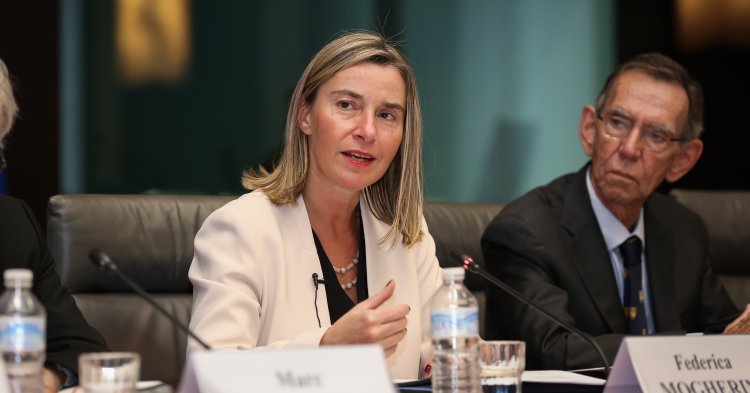An awareness on the part of European citizens and decision-makers is paramount. In 2050, the Earth will carry 9 billion people and Europe will have to play a role in the establishment of global governance that can meet the major challenges of the 21st century.
2050: a decisive deadline for Europe
The EU Global Strategy, presented by the High Representative of the Union for Foreign Affairs and Security Policy, Federica Mogherini, following the Brexit vote in 2016, was the opportunity to establish a real autonomous European foreign and security policy. The French notion of ‘strategic autonomy’ then became a central element of the European doctrine. But today, Europe lacks a big project, based on a vision, on ambition for the 21st century. In China, Xi Jinping asserts a desire for power and put in place a thoughtful strategy, with clear objectives and a detailed timetable. The main goal is to overtake the United States in 2049, for the centennial of the People’s Republic of China. In Saudi Arabia, the despot Mohammed bin Salman, Crown Prince and son of the current ruler, also designed a long-term project for the development of his country, condensed in the document Vision 2030.
It is essential for the European Union to determine a direction towards a decisive increase in its strategic capabilities. While China is aiming for the status of the world’s leading power, Europe could set itself the goal of becoming a ‘special’ power in international relations by 2050. The 2050 target would leave room for thirty years, more than enough time for major developments, as in the fields of Defence, Foreign Affairs, security or economy. The Union needs to develop a plan, consisting of:
1. Analysing the realities of the race for primacy engaged between the United States and China.
2. Carrying out a forecasting exercise.
3. Anticipating the movement of forces for 2050.
4. Equipping itself with operational defence and security systems.
5. Achieving convergence towards a common foreign policy.
6. Defining the conditions for a nuclear deterrent.
7. Creating the modalities of a new space ambition.
8. Decisively reinforcing its climate policy tools.
9. Becoming a green power, at the forefront of alternative energies.
While strong uncertainties remain concerning the United States staying in NATO, it is time for the Europeans to wake up and equip themselves with the necessary means, allowing the emergence of a powerful Europe, for the 21st century.
France, a key player in the need for a European strategic autonomy
France could seize this strategic stake and place itself at the heart of a European debate, on the emergence of a European power in 2050. France indeed has solid strategic bases to assert itself as a key player in European construction and as a diplomatic power, influential on the international scene. The reality of international relations revolves around the construction of power relations.
The United Kingdom continues to isolate itself in the turmoil of Brexit. Angela Merkel’s Germany has lost its influence. France has a stable majority, dominant diplomacy in Europe, a permanent seat in the UN Security Council, it has the nuclear weapon and is the premier military power of a future EU-27. In this context, the European Union becoming a permanent member of the UN Security Council is clearly not conceivable. The divergences in terms of foreign policy approach are still too strong between the European states, as demonstrated for example during the US military intervention in Iraq in 2003 or during the recent crisis in Venezuela.
The European Union must embark on an ambitious and long process of clarifying its international policy, which fully falls within the framework of a 2050 Strategy. Only when this approach is completed may the presence of the Union at the UN Security Council arise, within the legal framework of the Charter of the United Nations. On 25 June 2018, France launched a parallel defence action, the European Intervention Initiative (EI2), a project aimed to create new partnerships, with a real efficiency in the implementation of common objectives. At present, ten EU member states take part in it. Paris can embark on a new European dynamic by structuring groups of smaller states with the same will and the same capacity to move forward in favourable areas.
Destroying jihadism: a priority for Europeans
The Strasbourg attack in France on 11 December 2018 demonstrated that security and defence issues remained fundamental. Despite a relative weakening since 2017, the international jihadist movement will continue to assert itself as a real threat, over the next decade. For twenty years, the number of jihadists in the world has continued to grow, in proportions that are nevertheless difficult to assess. The promise of a great “final victory” over Daesh, uttered by a very indifferent Donald Trump, is exclusively an exercise of politician-like, short-term incantation.
The strategic structure to end the fight against jihadism, to irreparably defeat Al Qaeda and Daesh, has not been determined yet. The approach of the White House has led to a highly controversial foreign and military policy in the Middle East since the attacks of 11 September 2001. These excursions in the Middle East have largely demonstrated the USA’s limits, further accentuated by the improvisations of the current US President, in office since 20 January 2017.
The need to destroy jihadism should be a priority to unite the Europeans and strengthen the Union’s cohesion. The European Union could be at the forefront of an international initiative of strategic innovation, in order to establish the diplomatic and military bases for a decisive advance in the fight against jihadism worldwide. In addition, the demographic, climate and environmental imperatives are factors that make the development of global governance essential, while the world risks falling into increasingly extreme chaos.
Migration and climate challenges: the time for a European and global initiative
A migration crisis similar to what Europe experienced in 2015 can still happen in today’s world where the African demographic transition is very much ahead of the continent’s economic development. The planet has more than 7.6 billion inhabitants and the Earth will probably count over 9.5 billion in 2050. The effects of global warming are causing population displacements, which will increase, as territories become uninhabitable. Environmental change has already become one of the main factors, if not the main factor, of migration and displacement around the world, far greater than violence and conflict.
The “Global Compact for Safe, Orderly and Regular Migration” adopted in Marrakech on 10-11 December 2018, considers environmental change as a cause of migration and calls on states to combat climate change, including by implementing the Paris Agreement. In the meantime, international climate negotiations observe migration as an adaptation process to accompany and favour. A legal clarification remains to be made to determine a unique and comprehensive approach to climate change and population movements. People displaced because of global warming would deserve a specific study, analysing, in particular, the adequacy of the term “climate refugee”.
Europe can take the initiative on the international stage and propose a credible project of migration flow management, in a context of climate mutations, with a clear organisation and defined objectives, enabling the establishment of a coherent and common approach of environmental migrations. The stakes of the 21st century require us to stop exclusively defining ourselves within national borders, to finally place ourselves on a European scale and, more broadly, on a global scale.
Cyberspace: the ‘superspace of power’
There are four types of common spaces on the planet: the maritime space, the airspace, the exo-atmospheric space and the (very sensitive) cyberspace. Only very few nations in the world can master these four shared spaces. The United States asserts its predominance, while China continues a process of strong growth in the maritime, cyber and space industries. Second-rank players such as the United Kingdom and France are present in these four areas, but with less influence and power. A major strategic interest for the Union would be to ensure a strong European presence in these four abovementioned spaces.
448 submarine cables (totalling 1.2 million kilometres) are installed on the ocean floors and connect all continents, forwarding more than 95% of all telecommunications and digital data. This represents an extreme and fragile concentration of an unlimited strategic resource.
The cyberspace has become a major strategic ecosystem, a form of ‘superspace’ enabling control of all dimensions of power. It is a place of clandestine and permanent conflicts between countries, of multiple cyber-attacks led by states, hackers or terrorist groups.
By 2025, France intends to arm itself with 4,000 cyber-fighters. The need for a decisive reinforcement of the European cyberspace capabilities could federate the European states and thus materialise, with the prioritisation of the fight against jihadism, a first step towards the creation of a European Army, a long-term perspective that was proposed by the French President Emmanuel Macron.
Europe must build its strategic independence and its own defence, outside the declining framework of NATO, by adopting ambitious and innovative goals, breaking with outdated conceptions of a world that no longer exists, a world that was an open parenthesis in the middle of the 20th century and which closed up on 9/11. We are witnessing the end of the Western monopoly in international relations, the completion of geopolitical reality, marked by the distress of the transatlantic alliance.
Europeans must now give up their illusions and go beyond the somewhat ritual references to Franco-German or European cooperation, in order to start a cycle of clarification. This would enable the Union to engage in the implementation of an unprecedented process of foundation of a new world power, able to protect its vital interests and fundamental values.


Follow the comments: |
|
